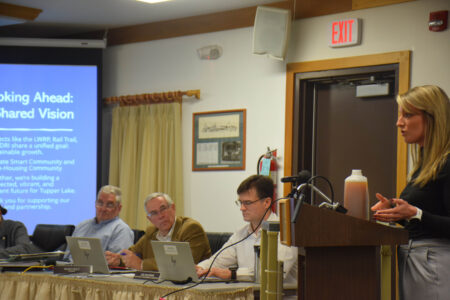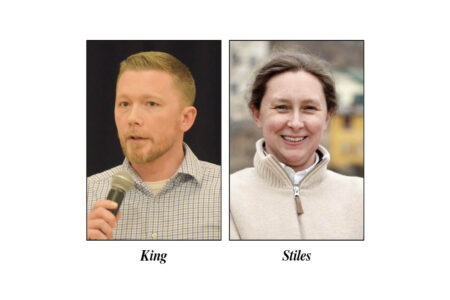Report finds allegations against APA head to be unsubstantiated
Closes case with no further action recommended

Adirondack Park Agency Executive Director Barbara Rice is seen at an agency meeting on May 22. (Enterprise photo — Chris Gaige)
RAY BROOK — A New York State Offices of the Inspector General report publicly released Monday by the Adirondack Park Agency found that allegations ostensibly made by APA employees against Executive Director Barbara Rice were “unsubstantiated” and closed the case with no recommendations for further action regarding the matters.
The report, which was initiated from an anonymous complaint received on Oct. 4, 2023, investigated four areas of alleged impropriety. These include: ¯ Rice’s involvement in the 2023 Adirondack Planning Forum procurement, and the alleged appearance of “self-dealing.”
¯ Rice’s intention to relocate APA headquarters from Ray Brook to Saranac Lake in violation of legislative appropriation.
¯ An alleged conflict of interest in Rice’s involvement in an enforcement matter.
¯ Allegations of general APA mismanagement and retaliation against employees who voiced disagreement with her decisions.
“I am pleased with the outcome of the investigation,” Rice said in a provided statement Monday. “Moving forward, I am excited to continue building upon all of the successes that we have achieved over the past three years.”
Outgoing APA Chairman John Ernst, whose tenure concluded on June 30, lauded Rice’s leadership in a statement and said the report’s findings did not come as a surprise to him.
“Executive Director Barbara Rice is an exemplary public servant who led the Agency with the upmost professionalism throughout this investigation,” he said. “I am not surprised that the claims against her were unsubstantiated, the case closed and her name cleared. We thank the Inspector General’s Office for its diligence on this matter.”
The report in its entirety can be viewed at tinyurl.com/5n7z9953.
–
Adirondack Planning Forum findings
–
The NYSIG report first examined an allegation that Rice had used her authority as executive director to move the Adirondack Planning Forum — an annual conference hosted by the APA geared toward local officials and stakeholders — from Lake Placid, where it had been held previously, to Saranac Lake in 2023 in order to benefit herself and the village, where she lives and previously held positions in local government.
The allegation against Rice centered around the planning forum taking place at the Hotel Saranac, and accused her of insisting it be held there on account of her ties to the village. The NYSIG report did not find any evidence to support that.
“NYSIG did not find any evidence to show that Rice has any affiliation with Hotel Saranac, or that moving the Planning Forum to the hotel benefitted Rice directly,” the report states.
NYSIG investigated the APA’s invitation for bid process in selecting a conference venue for the planning forum. It found that there had been three rounds of bid invitations put out by the APA. There were no bidders for the first two between July and August of 2022 and Hotel Saranac as the sole bidder for the third round in November 2022.
State finance laws restrict who offerers, or potential bidders, may contact during a period of time around the invitation for bids to prevent improper influence on the process. The law dictates that offerers may get in touch with the “designated contact” of the offeree — in this case, the APA — during the restrictive period.
The report notes that Rice was not the APA’s designated contact during these rounds of bidding. In an interview with NYSIG, Rice stated that she was aware that she should not have made contact with Hotel Saranac during the restricted periods, and denied having done so.
NYSIG’s investigation of “phone records associated with Rice” showed that there had been an outgoing phone call to Hotel Saranac, lasting approximately four minutes, that occurred on Aug. 3, 2022.
“While this demonstrates contact with Hotel Saranac during the restricted period and before Hotel Saranac submitted their successful bid, NYSIG cannot make a determination as to the substance of this contact and, moreover, as Hotel Saranac was the only responsive bidder, cannot conclude that the communication improperly interfered with the selection process.”
The report added that there were no other viable options for the APA to consider, given that Hotel Saranac was the only bidder.
–
Moving APA headquarters
–
The report investigated a complaint that Rice had attempted to relocate the APA headquarters from Ray Brook to Saranac Lake. It claimed that it was done in a manner that was in violation of the legislative appropriation for the move, and misleading state officials in the Executive Chamber — which includes the governor’s immediate staff — by failing to make them aware of the increased construction costs of the proposed new headquarters, and by attempting to move the location.
On the location point, the report concluded that while initial analysis of the governor’s proposed fiscal year 2022-23 budget undertaken by the state Assembly included language dictating a $29 million appropriation for a new APA headquarters in Ray Brook, the final approved budget did not specify a location for the new headquarters, stating instead that the appropriation was for: “services and expenses related to the rehabilitation and construction of facilities, including but not limited to design and construction, consultation, inspection and engineering, and personal services, fringe and indirect costs.”
Given that the location was not specified, the report concludes that Rice did not act improperly or outside of her authority in proposing moving the headquarters to Saranac Lake. The report separately investigated if Rice had acted improperly in regards to a feasibility study that the APA had commissioned Bergmann Associates to undertake to help determine if the new proposed headquarters location, the historic Paul Smith’s Electric Light and Power Building at 1-3 Main St., would meet the APA’s needs.
The complaint made against Rice alleged that she hired David Plante from Bergmann Associates as Deputy Director of Regulatory Programs at the APA following the study as a “quid pro quo” for a favorable outcome. The report found that Plante was not involved with the study when he was with Bergmann Associates, and that Rice did not act improperly in hiring him. According to a state Division of Budget employee interviewed as part of NYSIG’s investigation, feasibility studies are generally favorable, given that their purpose is to develop a plan that fits within the necessary parameters.
“(U)nless a project is impossible, it is expected that the study will be favorable,” the report states. “NYSIG did not find any evidence that Rice had any direct connection to Bergmann Associates, nor that Rice’s hiring of an outside entity to conduct a feasibility study was improper, or outside of regular practice.”
On the increased costs point, the report describes allegations from an APA employee that during a March 4, 2024 meeting between Rice, representatives of the state Division of Budget and representatives with the Executive Chamber, she mentioned there was a budget issue regarding the new headquarters before recanting that statement when the Assistant Secretary for Environment noted that they were unaware of any budget isses. That day, Bergmann Associates informed the APA that the costs of the new headquarters had gone up between $8 million and $10 million, though the report does not explain what accounted for that increase — which exceeded the appropriation at the time.
The report finds that Rice did not violate the approved appropriation. While the costs had increased, that did not represent a finalized proposal, ostensibly giving the APA the chance to either reduce the costs to fall in line with the appropriation or make a new appropriation request to cover the costs before finalizing the proposal.
The report also investigated an allegation that the move was improper because the APA would have to grant itself a building permit for proximity to a shoreline area, known as an 814 Order. The report said that while the APA generally discourages 814 Orders, instead working with those seeking building approval to modify their plans in a way that foregoes the need for one, they are still granted on occasion. Furthermore, the report found precedent for the APA granting itself an 814 Order for past projects the agency has undertaken. The report notes that testimony from Rice and another APA employee stated that the review process for a permit for a potential new headquarters would be handled by APA staff who are not involved in the building project.
NYSIG also investigated allegations that Rice wanted to move the headquarters to Saranac Lake to benefit her family’s furniture store there. The report concluded that the potential move’s distance from Ray Brook to Saranac Lake was so minimal that it would not impact employees’ spending habits and that Rice had said her family’s store would not bid to furnish the new headquarters.
“NYSIG did not find any evidence to support the allegation that Rice’s interest in moving the headquarters was motivated by a potential benefit to Rice’s family store,” the report states.
–
Alleged conflict of interest in enforcement matter
–
The report investigated one instance where Rice was alleged to have used her authority to change an agency decision in an enforcement case to benefit one of her friends. The NYSIG report does not state what that case was, but did confirm that it involved a family friend of Rice.
“Based on a call she received from a family friend, Rice asked an employee to re-open a case that had already been reviewed and closed,” the report states. “When asked about the allegation, the employee involved noted that the scenario was troubling in that Rice was involving herself with an enforcement case where she knew one of the players personally, adding that such requests were never made by the former APA Director.”
NYSIG’s investigation found that the APA’s decision on the matter was never ultimately changed, as had been alleged.
“Accordingly, NYSIG did not find any evidence that Rice improperly changed an enforcement decision,” the report states.
–
Mismanagement and retaliation allegations
–
The report investigated two allegations of agency mismanagement by Rice, as well as allegations of retaliation against APA staff who voiced opposition to the headquarters relocation. The claims included either refusing to promote employees, refusing to fill support positions for staff or stripping certain duties or responsibilities away from staff members who opposed her plans. One mismanagement allegation was that the required APA annual reports for 2022 and 2023 were delayed and the other centers around monthly staff meetings.
On the agency reports, Rice indicated to NYSIG investigators in a Feb. 15, 2024 interview that the 2022 annual report had just been published and that the 2023 report was in progress. The delay was attributed to having other priorities when she became executive director in March 2022, and has since reprioritized. The NYSIG report notes that the APA’s annual reports for 2023 and 2024 have subsequently been published and are available on the agency’s website.
On the monthly staff meetings, the complaint against Rice was that she failed to make those available virtually and failed to afford “reasonable accommodations” for staff not wanting to be present in person at the times of those meetings. The APA has a 50% telecommuting policy, enabling employees to work remotely half of the time, with employees allowed to determine those dates.
“NYSIG determined that the allegation regarding staff meetings stems from employees not wanting to adjust their schedules to attend monthly meetings in person,” the report states. “However, the decision of when and where an all-staff meeting is held, including the requirement that it be conducted in person, is within the authority of the agency director.”
Regarding alleged retaliation, the NYSIG report described several instances that employees had either testified to or described, but noted that these instances — with all but one of which the report neither confirmed nor denied actually took place — would be within Rice’s management discretion to affect if they did occur.
The one instance had to do with an employee, represented by the Professional Employees Federation AFL-CIO union, claiming that Rice had attempted to terminate their access to their assigned work vehicle. In the NYSIG interview, Rice told investigators that she questioned the need for this vehicle access given the employee’s job description — which was not stated in the report. In the end, however, NYSIG determined that the vehicle access was not changed.
The report notes that the allegations “do not lay out a specific claim of retaliation or adverse action based on any individual employee’s cooperation with the Inspector General.”
The report was dated May 22, and was signed by various NYSIG supervisors on June 9 and 10, capping off an approximately 20-month investigation.




